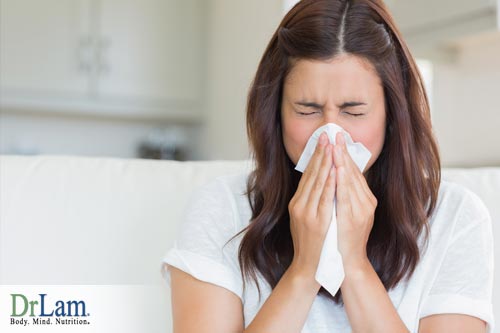 Allergies are a common symptom of people suffering from Adrenal Fatigue Syndrome (AFS). More than 50 million Americans are affected by allergies every year, which equates to a lot of sneezing, wheezing, nasal congestion, runny noses, watery eyes, and general itchiness, particularly in the spring, summer, and early fall. However, allergy medications are not necessarily the way forward; there are natural ways to beat hay fever. You can make the best of natural allergy therapy to prevent and lessen the unpleasant symptoms of allergies, optimize your NeuroEndoMetabolic (NEM) stress response, and stay healthy while recovering from AFS.
Allergies are a common symptom of people suffering from Adrenal Fatigue Syndrome (AFS). More than 50 million Americans are affected by allergies every year, which equates to a lot of sneezing, wheezing, nasal congestion, runny noses, watery eyes, and general itchiness, particularly in the spring, summer, and early fall. However, allergy medications are not necessarily the way forward; there are natural ways to beat hay fever. You can make the best of natural allergy therapy to prevent and lessen the unpleasant symptoms of allergies, optimize your NeuroEndoMetabolic (NEM) stress response, and stay healthy while recovering from AFS.
Allergies often present in adrenal fatigue due to an overactive inflammatory response and increased histamine release. In accordance with the NEM stress response, much inflammation in the body stems from the gut. When the body is low on energy, the digestive system may slow down. Food will stay in the gut longer, irritating the stomach and releasing inflammatory compounds. At the same time, the adrenals are not able to produce sufficient cortisol. Cortisol is an anti-inflammatory hormone. A decrease in cortisol results in an increase in inflammation. As inflammation increases, the body becomes more sensitive to any irritants or allergens. As a result food sensitivity, chemical sensitivity , and allergic reactions tend to occur more often.
An allergy is a hypersensitivity to something in the environment that causes our immune system to overreact. For most people, allergen particles cause little to no problems. It’s the harmful pathogens, like viruses and bacteria, that should instead be sparking our immune system into action. Allergens like pollen are actually quite harmless to the body. However, a result of both genetic and environmental factors, sometimes white blood cells see the allergens as threats, triggering an inflammatory response that releases chemicals like histamine.
Normally, histamine acts as a inflammatory compound, increasing the permeability of capillaries to white blood cells in the body, allowing them to engage the foreign pathogens in the infected tissues.
There are many different types of allergies, including seasonal allergies, food allergies, allergic asthma, atopic dermatitis, and anaphylaxis. The severity of allergic reactions vary from mild discomfort to sometimes life threatening situations. The most common allergy is the seasonal allergy, also known as hay fever, pollinosis, or allergic rhinitis.
In this case, pollen is the main offender. Tiny pollen particles (allergens) released from grasses, weeds, and trees blow around in the wind, easily invading the body. It is said that early life exposure to an allergen could prevent an allergy from developing, yet 10 to 30 percent of people in the Western world experience allergy symptoms every year.
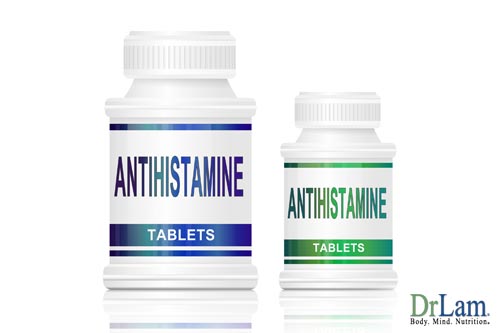 The best way to prevent an allergic reaction is avoidance– which is not always an option. In traditional medicine, the most common allergy therapy treatments are over-the-counter antihistamine drugs. Sometimes steroids or allergen immunotherapy are used as well. These medications often come with unwanted side effects. For example, antihistamine often causes drowsiness, as well as dry mouth and occasional stomach issues. They can also be a burden to your liver to metabolize and dispose of.
The best way to prevent an allergic reaction is avoidance– which is not always an option. In traditional medicine, the most common allergy therapy treatments are over-the-counter antihistamine drugs. Sometimes steroids or allergen immunotherapy are used as well. These medications often come with unwanted side effects. For example, antihistamine often causes drowsiness, as well as dry mouth and occasional stomach issues. They can also be a burden to your liver to metabolize and dispose of.
Allergies don’t have to be inevitable or chronic. By undertaking natural therapy for allergies, however, one can avoid and mitigate the unpleasant symptoms of allergies with no need for medication. Instead of loading up on drugs, you can take care of yourself in a more natural way and avoid nasty side effects. Listed below are some natural health habits that can help to relieve, reduce, or prevent allergy symptoms (particularly seasonal). Upon following these suggestions, you may just find that you’re no longer a slave to the likes of pollen.
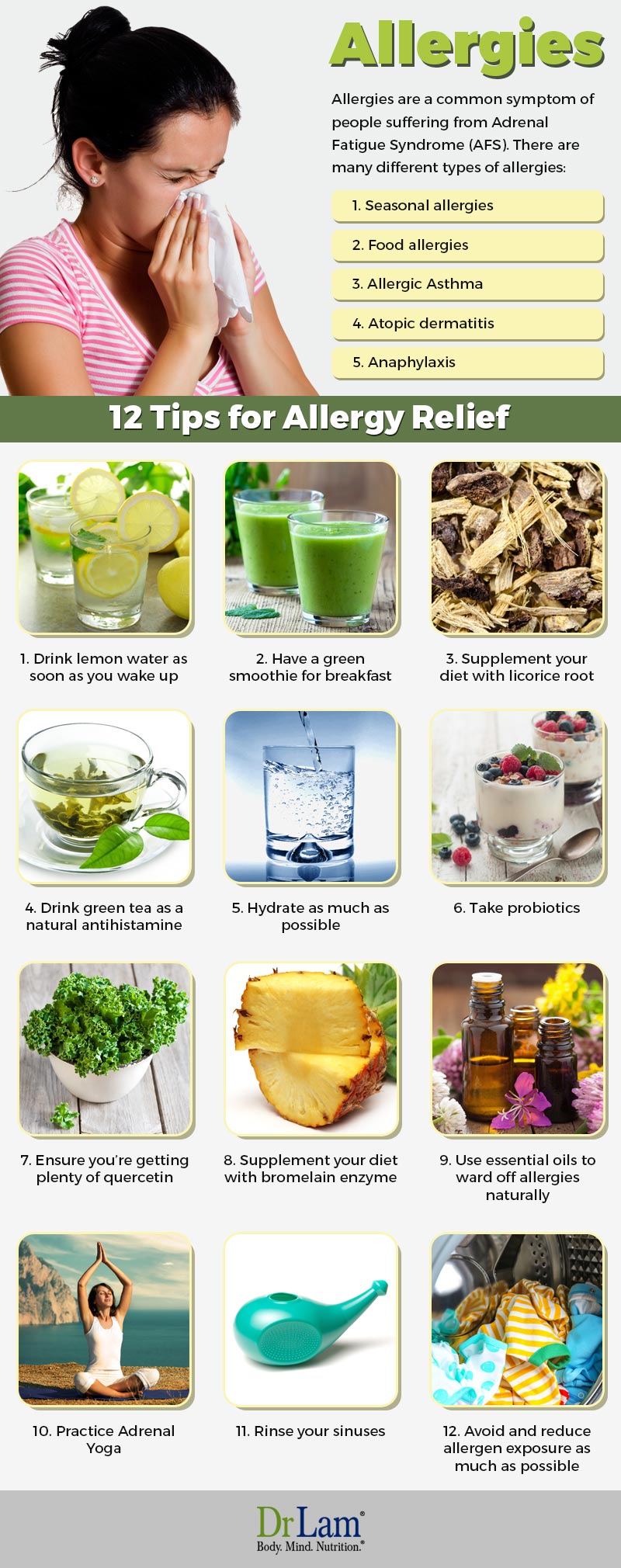
Drinking a big glass of lemon water first thing in the morning on an empty stomach is not only hydrating, but excellent for your health year-round. It helps with allergy symptoms, digestion, weight loss, clear skin, detoxification, pH levels, and an overall immune system boost.
Add one teaspoon of turmeric powder to your lemon water during allergy season as it will help to jumpstart your digestion and flush the toxins from your liver, including any pollen or other pollutants you may have inhaled throughout the night. This daily routine is therapeutic for your allergies, as it can help your body to detoxify and refresh, lessening your symptoms.
After you’ve consumed your glass of lemon water, fill up on nutrient-dense food to start your day. Invest in a decent blender to mix all of the ingredients together. Try to avoid dairy-based smoothies as it can feel heavy in your stomach; lactose intolerance is ever-increasing, as cow’s milk is naturally intended for calves, not humans.
Start with a base of water, almond milk, or coconut water– not too much, as you can always add more if the smoothie turns out too thick. Then, add one to two cups of various chosen fruits, such as frozen berries, mangoes, apple chunks, and/or banana. Add one to two cups of leafy green vegetables like spinach or kale, along with a tablespoon of chia seeds, milled flax seed, and/or protein powder for an added superfood kick. A bit of avocado will add a smooth texture to any smoothie, in addition to the healthy fat it brings.
Blend all of the ingredients together to kickstart your day with some genuine nutrition and natural allergy therapy– it will help you get through the day, breezing through pollen-filled air with minimal symptoms.
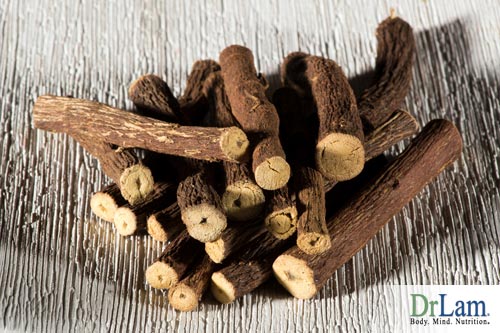 Licorice root, herbally known as ‘glycyrrhiza glabra’, is particularly effective in natural allergy therapy. It’s an excellent anti-inflammatory that can help to reduce inflamed skin, soften mucus, relieve sinus congestion, and open up the lungs. Licorice root also contains antiviral, antitumor, antimicrobial, and antibiotic properties, and can increase your body’s levels of naturally-produced steroids.
Licorice root, herbally known as ‘glycyrrhiza glabra’, is particularly effective in natural allergy therapy. It’s an excellent anti-inflammatory that can help to reduce inflamed skin, soften mucus, relieve sinus congestion, and open up the lungs. Licorice root also contains antiviral, antitumor, antimicrobial, and antibiotic properties, and can increase your body’s levels of naturally-produced steroids.
When healing adrenal fatigue, you must balance your hormone levels– cortisol in particular. Licorice root aids in the production and regulation of cortisol in the body. This not only helps with allergies, but gives your adrenal glands a rest, helping in recovery from AFS.
Use with caution, however, as licorice root supplements are not recommended for pregnant women and consuming large amounts could lead to heart problems. Licorice root may also be stimulating in advanced cases of adrenal fatigue. It can trigger debilitating adrenal crashes.The risk of this increases the more advanced the stage of AFS a person is in.
A type of catechin called EGCG (epigallocatechin gallate) is present in green tea, acting as an antioxidant and a powerful, naturally-occurring antihistamine. Because of it’s antihistamine activity, green tea is also a natural remedy for allergic skin reactions like hives, which cause redness, itchiness, and swelling of the skin.
For an added immune system boost from your green tea, add the herb echinacea, and for increased allergy therapy, add some nettle leaf. There are a wide range of green tea products available, both in loose leaf or tea bag format. You can even purchase EGCG supplements from a health food store if you aren’t keen on green tea, which does contain caffeine and can be stimulating on your adrenals. Green tea is a stimulant. Those with advanced AFS need to be careful as it can also trigger adrenal crashes, insomnia, heart palpitation, anxiety, and panic attack.
Drinking enough water is incredibly important for all aspects of health, especially in regard to AFS recovery and seasonal allergy therapy. When parts of the body are dehydrated, they do not perform optimally, including the lungs. For example, when you have a dry nose, your brain signals your body to produce more mucus so that the air sent to the lungs stays moist.
By staying sufficiently hydrated, your body is able to flush pollen and other allergens out of your system via urine and your mucus membranes remain moist. This produces a calming effect on the brain, reducing inflammation.
Gut health is critically important for overall health. This is why we must eat a nutritional diet and stay hydrated. When the body is healthy and the NEM stress response function is in balance, the intestines are full of beneficial bacteria and microflora that help us to maintain a strong immune system. The right balance of bacteria can help to fight allergens and a multitude of harmful pathogens that lead to infection.
These days, however, unhealthy lifestyles full of stress, environmental toxins, and processed foods can have a negative effect on our gut health, leading to maladies like allergies and other disorders. Probiotics can have a direct effect on your immune system, and are therefore a great natural allergy therapy.
Supplement your diet with probiotic capsules or consume yogurts that contain naturally-occurring probiotics. Populating your gut with active probiotics could help to relieve your allergy symptoms and speed up the recovery process of AFS.
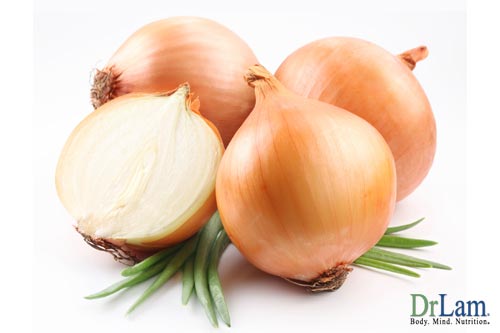 Quercetin is a type of flavonoid that is found in foods like garlic, onions, capers, kale, buckwheat, and watercress.
Quercetin is a type of flavonoid that is found in foods like garlic, onions, capers, kale, buckwheat, and watercress.
A safe and easy method of natural allergy therapy, it has been shown to stabilize cells that produce inflammatories like histamine in response to allergens. Quercetin is also available in supplement form; the recommended dosage is 600 – 6000 mg and should be taken on an empty stomach.
Bromelain, found in pineapple stems, is a natural enzyme that has anti-inflammatory properties. It has the ability to inhibit the production of mucus and swelling of nasal passages, making it extremely therapeutic for allergies and asthma. In fact, a study found that mice who received bromelain experienced an anti-inflammatory response in their lungs.
Be sure to purchase only high quality bromelain supplements and take doses of 600 – 2000 mg, also on an empty stomach.
A combination of lavender, peppermint, and lemon essential oils can be wonderfully therapeutic for instant allergy relief. Lavender is a natural antihistamine, peppermint helps to open up airways and capillaries, and lemon essential oil helps to thin mucus and flush out toxins.
As essential oils are highly concentrated, methods of usage are important. Diffuse the trio of oils in a diffuser or just a few drops on a tissue and breathe in; apply topically by combining one to two drops of each and rub on the back of the neck or soles of the feet; or ingest one to two drops of each in a big glass of water or a spoonful of local honey.
In the AFS recovery process, essential oils are an excellent natural remedy for allergies and other respiratory issues; the oils also help to maintain a clean and unpolluted extracellular matrix (ECM) within the body, promoting optimal health overall.
Practicing Adrenal Yoga can be highly beneficial to your mind, body, and soul– especially if you are suffering from allergies and/or adrenal fatigue. The breathing exercises of Adrenal yoga, are therapeutic for allergies by helping to strengthen and calm the respiratory, nervous, and immune systems, as well as clear the nasal passages.
Stress is the main cause of AFS and NEM stress function imbalance. The breathing, meditation, and chanting aspects of yoga can be highly effective in combating stress, focusing the mind, and toning your body, which are beneficial to your overall health and immunity. Namaste.
An effective therapy for seasonal allergies is to rinse your sinuses with a neti pot, which is available in drugstores and looks like a small teapot with a long spout.
To use, fill the neti pot with distilled water and rinse one nostril at a time– this will flush pollen and other debris from your nasal cavity and help to thin the mucus. Do this sinus rinse twice daily to alleviate allergy symptoms.
Of course, the most effective way to ward off allergy symptoms is to avoid the triggers altogether, which is easier said than done.
 A simple way to limit exposure is to shower before going to bed in order to rinse any pollen or other allergens from your body and hair. Similarly, wash any clothing that may have come into contact with allergy triggers throughout the day.
A simple way to limit exposure is to shower before going to bed in order to rinse any pollen or other allergens from your body and hair. Similarly, wash any clothing that may have come into contact with allergy triggers throughout the day.
Take your shoes off before entering your house and be sure to vacuum at least once a week to prevent allergens from building up on surfaces. And finally, do your best to keep windows and doors closed during allergy season. By taking advantage of the above strategies for natural allergy therapy, one can lessen the effects of symptoms or avoid them altogether.
So remember: drink a glass of lemon water when you wake up; supplement your diet with licorice root, quercetin, bromelain enzyme, and probiotics; drink a green smoothie for breakfast; hydrate as much as possible; drink green tea; use essential oils; rinse your sinuses; practice yoga; and do your very best to avoid allergens at all costs.
These natural methods will help to relieve and prevent allergies, balance your NEM stress response function, speed up the AFS recovery process, and promote optimal health overall.
© Copyright 2017 Michael Lam, M.D. All Rights Reserved.
